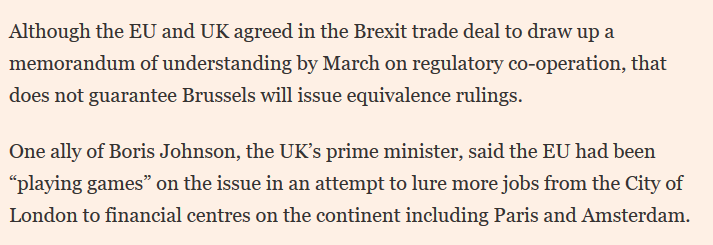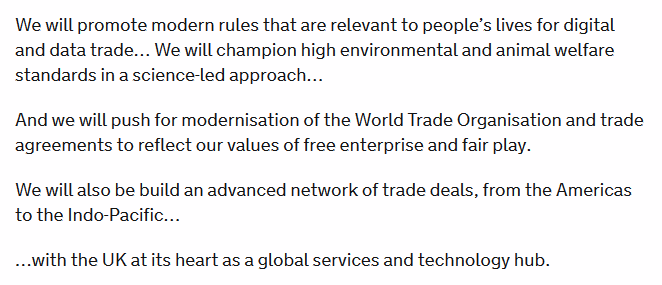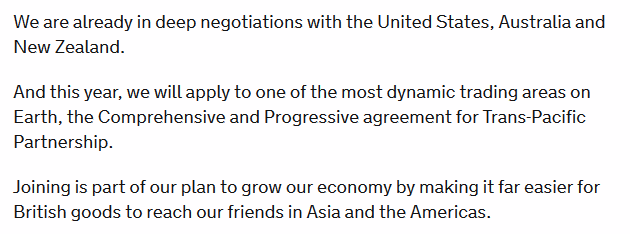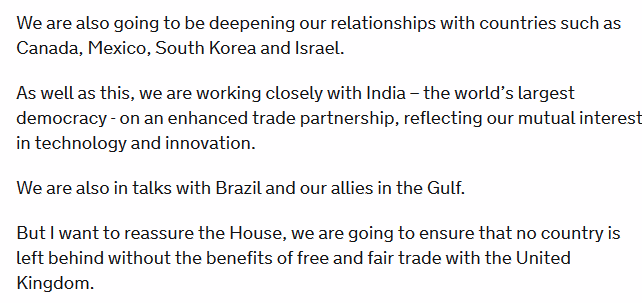
Ten days in and it seems the government's post-Brexit economic policy is to ignore reality, priority and choice, and just claim with no evidence that everything is going to be great. This, needless to say, is dangerous territory. Exhibit 1... 1/ ft.com/content/cdaf23…
Here's a good example of what is currently passing for UK economic policy. The theory the UK can be 'nimble' in regulations has been present since 2016. In 5 years nobody has found the detail. We presume others might have a similar idea. And trade needs regulations to align 2/ 

There will of course always be someone to blame. Usually the EU. Because they do indeed want to compete with the UK. This is not exactly surprising. A vague UK idea versus the bigger next door market (or indeed a big one over the pond). Who's going to win? 3/ 

Next, 'Global Britain' and specifically the Liz Truss speech in the Commons yesterday. To summarise, we are going to do trade deals on everything with everyone while still protecting UK industry and poor countries. Yup, more warm words and no priorities. 4/gov.uk/government/spe…
Useful example here. The long running EU-US trade battle over food, one claiming to be about quality, the other science. The UK solution. We'll do both! Fabulous, why did nobody think of this before? Unless they did, and found they still had to choose. Note other warm words 5/ 

Now about those trade deals. There is a deal we need now with the US to remove punitive tariffs on Scotch that is costing the UK economy millions of pounds. It was supposed to be close before Christmas. Any word of that in the speech? No. 6/ bbc.co.uk/news/business-…
No US deal yet, instead we have the usual warm words about being deep in talks, and the CPTPP. But for what? If we get deals with Australia and NZ we'll have deals with 10 of 12 CPTPP countries. How will joining then help goods trade? And why goods, not services? 7/ 

Just to prove this speech about global Britain really is motherhood, apple pie, and virtually nothing of any substance, in fact every country is a priority. We love you all. All can benefit from trading with us. Except perhaps our neighbours, who get virtually no mentions. 8/ 

There was also no mention yesterday for this kind of UK trade, the type that damages other countries. Limitations of space I guess. But does somewhat take the gloss off the wonderful trading opportunities we present. 9/ theguardian.com/environment/20…
Back though to the Chancellor to finish this roundup of the UK's economy, and let's look at Northern Ireland. Not everyone's favourite here, Sammy Wilson, raised with him yesterday problems of GB-NI trade. Brushed off with scarcely an answer. 10/ 

Now that's all good knockabout stuff, but the key point is a government that simply can't accept in public or possibly in private that it can't have everything on trade / the economy. We've seen it on Northern Ireland. We're now seeing it on EU trade. 11/ cityam.com/northern-irela…
So a multinational business wants to invest in the UK. They get a meeting with the Chancellor. He doubtless assures them everything will be great, regulations, trade, whatever. Do they believe him? Would you?
Right now they don't. Big talk, little reality. Tough world. 12/ end
Right now they don't. Big talk, little reality. Tough world. 12/ end
PS sorry, it is 11 CPTPP members right now. We'll have bilateral deals with all except Brunei and Malaysia. 12 was TPP, with the US. Not sure why I suddenly regressed to 2015.
https://twitter.com/DavidHenigUK/status/1348910920202903557
• • •
Missing some Tweet in this thread? You can try to
force a refresh



